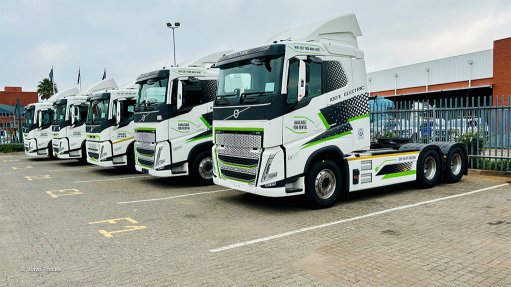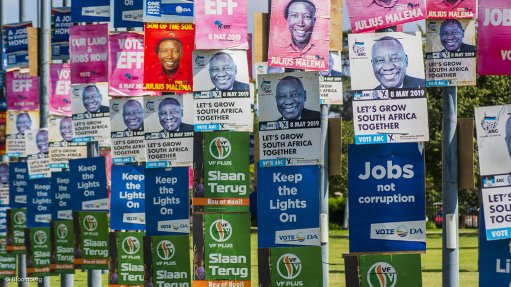Presidential hopeful plans to shun debt-fueled Kenyan projects
Kenyan Deputy President William Ruto, the front-runner to become the nation’s next leader, will scale back spending on mega roads, rail and energy projects, rein in debt and pump more money into small business if he wins this year’s election.
The 55-year-old former cabinet minister plans to implement a so-called Bottom-Up model, with the creation of a 200-billion-shilling ($1.8-billion) fund for small businesses to expand their production in industries ranging from housing and food-processing to manufacturing. It would be financed by diverting resources within the budget -- estimated by the National Treasury to be about 3.3-trillion shillings in 2022-23 -- from major infrastructure projects, Ruto said in an interview.
The plan “will give us an opportunity to reorganize our investments, reorganize our priorities,” he said in Washington on March 5.
The program, if implemented, would mark a departure from the current administration’s approach to expanding East Africa’s biggest economy. President Uhuru Kenyatta’s administration has invested-billions of dollars in projects including a railway linking the port city of Mombasa, the capital Nairobi and the nearby Naivasha town, with many of them funded with loans from China. While the spending helped shore up economic growth, it has also put public finances under pressure.
Kenya’s budget deficit is projected by the Treasury to be 8.1% of gross domestic product in the year through June, wider than an earlier forecast of 7.5%, and the government plans to offer $1-billion of Eurobonds this year. The International Monetary Fund has warned that Kenya faces a high risk of debt distress.
“It’s time that we need to be a bit more cautious in contracting debt,” Ruto said. While the government focused on mega-infrastructure projects to provide a foundation for an economic liftoff, it now has “to be deliberate about investments that would create jobs” for the roughly 800 000 Kenyans entering the labor market each year, he said.
Ruto’s approach to drawing more people into the economy stems from his own rags-to-riches tale. A self-described “hustler,” he started out as a street-side trader, accumulated a fortune as he expanded into real estate and farming, and worked his way into the upper echelons of the nation’s political elite. Prior to being appointed to his current post in 2013, he served as a lawmaker and held several ministerial portfolios.
The deputy president intends to fund his economic plan by widening the tax base, a move he said would swiftly raise annual collections of 1.6-trillion shillings by more than 70%. Any discussion on increasing tax rates is “off the table,” he said.
Kenya has East Africa’s largest economy and is a regional diplomatic hub. Nairobi hosts the global headquarters of the United Nations Environment Programme and the regional offices for global brands, including Alphabet Inc.
OPINION POLLS
The election scheduled for Aug. 9 will pit Ruto against opposition leader Raila Odinga. Opinion polls put Ruto in the lead, with his approval rating standing at 38% among likely voters, compared with 27% for Odinga, Nairobi-based pollster TIFA Research said in a survey published last month.
Odinga, who failed to win the presidency on four previous attempts, agreed in March 2018 to work with one-time arch-rival Kenyatta to end longstanding political tensions. Their détente saw Kenyatta backtrack on a pledge to back Ruto to succeed him when he stepped down at the end of his second term, and fractured the ruling Jubilee Party. Ruto is now building a new party, while Jubilee is forging an alliance with Odinga.
This year’s vote will be Africa’s most closely watched, and Kenyan religious leaders have urged rival politicians to dial back on their rhetoric to avoid a repetition of violence in previous ballots.
Prior to teaming up and winning 2013 and 2017 elections, Ruto and Kenyatta faced off in a disputed 2007 vote that triggered ethnic fighting in which at least 1 100 people died and 350 000 others were forced to flee their homes. The two faced charges of crimes against humanity at the International Criminal Court, but the cases were eventually dropped because of a lack of evidence.
Ruto maintains that he didn’t instigate the violence. “Many innocent people are dragged to court,” Ruto said. “It doesn’t make them guilty at all. It just gives them an opportunity to prove their innocence. And that’s what I did.”
The deputy president said he is confident the upcoming election will be peaceful and he will “absolutely” accept the results, even as he urged the government to be non-partisan and allow people to make their choices independently.
“That’s what democracy is all about,” Ruto said, “You win or you don’t.” He added: “I hope my competitors on the other side would have the same view and accept the results of the election if I beat them.”
Comments
Press Office
Announcements
What's On
Subscribe to improve your user experience...
Option 1 (equivalent of R125 a month):
Receive a weekly copy of Creamer Media's Engineering News & Mining Weekly magazine
(print copy for those in South Africa and e-magazine for those outside of South Africa)
Receive daily email newsletters
Access to full search results
Access archive of magazine back copies
Access to Projects in Progress
Access to ONE Research Report of your choice in PDF format
Option 2 (equivalent of R375 a month):
All benefits from Option 1
PLUS
Access to Creamer Media's Research Channel Africa for ALL Research Reports, in PDF format, on various industrial and mining sectors
including Electricity; Water; Energy Transition; Hydrogen; Roads, Rail and Ports; Coal; Gold; Platinum; Battery Metals; etc.
Already a subscriber?
Forgotten your password?
Receive weekly copy of Creamer Media's Engineering News & Mining Weekly magazine (print copy for those in South Africa and e-magazine for those outside of South Africa)
➕
Recieve daily email newsletters
➕
Access to full search results
➕
Access archive of magazine back copies
➕
Access to Projects in Progress
➕
Access to ONE Research Report of your choice in PDF format
RESEARCH CHANNEL AFRICA
R4500 (equivalent of R375 a month)
SUBSCRIBEAll benefits from Option 1
➕
Access to Creamer Media's Research Channel Africa for ALL Research Reports on various industrial and mining sectors, in PDF format, including on:
Electricity
➕
Water
➕
Energy Transition
➕
Hydrogen
➕
Roads, Rail and Ports
➕
Coal
➕
Gold
➕
Platinum
➕
Battery Metals
➕
etc.
Receive all benefits from Option 1 or Option 2 delivered to numerous people at your company
➕
Multiple User names and Passwords for simultaneous log-ins
➕
Intranet integration access to all in your organisation


















